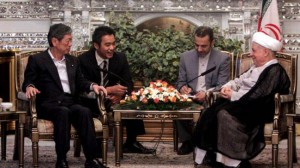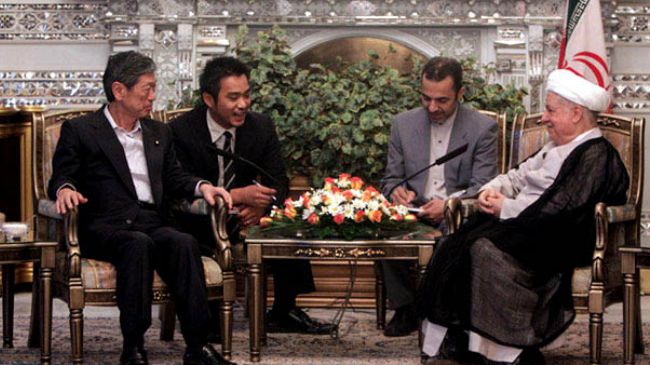 The chairman of Iran's Expediency Council says not only is the Islamic Republic opposed to atomic weapons, but it also seeks the annihilation of all weapons of mass destruction in the world.
The chairman of Iran's Expediency Council says not only is the Islamic Republic opposed to atomic weapons, but it also seeks the annihilation of all weapons of mass destruction in the world.�We explicitly announce that we are not only against the production and use of nuclear arms, but based on the fatwa of the Leader of the Islamic Revolution [Ayatollah Seyyed Ali Khamenei] we consider it a sin,� Ayatollah Akbar Hashemi Rafsanjani said on Sunday.
Rafsanjani made the comments in a meeting with Masahiko Komura, the special envoy of Japanese Prime Minister Shinzo Abe to Iran.
�Furthermore, we seek the destruction of weapons of mass destruction in the world,� the Iranian official added.
In February 2012, Ayatollah Khamenei said the Islamic Republic considers the pursuit and possession of nuclear weapons �a grave sin� from every logical, religious and theoretical point of view.
The Leader described the proliferation of nuclear weapons as �senseless, destructive and dangerous,� adding that the Iranian nation has never sought and will never seek atomic bombs as the country already has the conventional capacity to challenge the nuclear-backed powers.
Referring to Tehran�s nuclear talks with the world powers, Rafsanjani said if the P5+1 (the five permanent members of the UN Security Council plus Germany) refrained from making up excuses, the Iranian nation and administration are ready to reciprocate confidence-building measures and conduct �real negotiations without preconditions.�
�The Islamic Republic of Iran has always acted within the regulations of the [International Atomic Energy] Agency (IAEA) and will continue to do so,� Rafsanjani said.
Iran and the P5+1 group have held several rounds of talks on a range of issues, with the main focus being on Iran�s nuclear energy program.
The two sides wrapped up their latest round of negotiations on April 6 in the Kazakh city of Almaty. An earlier round had been held in Almaty on February 26-27.
The United States, Israel and some of their allies falsely claim that Iran is pursuing non-civilian objectives in its nuclear energy program, with the US and the European Union using the unfounded allegation as a pretext to impose illegal sanctions on Iran.
Tehran strongly rejects the claim, maintaining that as a committed signatory to the Non-Proliferation Treaty (NPT) and a member of the IAEA, it has the right to use nuclear technology for peaceful purposes.
Meanwhile, numerous inspections of Iran�s nuclear facilities by the IAEA have never found any evidence showing that the Iranian nuclear energy program has been diverted toward non-civilian purposes.
By Press TV
The Iran Project is not responsible for the content of quoted articles.











